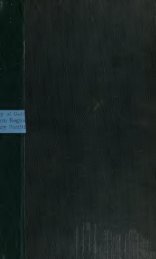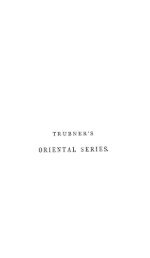Untitled
Untitled
Untitled
You also want an ePaper? Increase the reach of your titles
YUMPU automatically turns print PDFs into web optimized ePapers that Google loves.
i<br />
116 NOTES ON THE SECOND DISCOURSE<br />
i<br />
The full name of Buzurjmihr of Qayin was Amir Abd Mansiir<br />
Qasimribn Ibrahim; and "he flourished during thf same period as the<br />
, above-mentioned Zinati. Abu Mansrir ath-Tha'alibi mentions him* in*<br />
tbe Tatimma 1<br />
or , Supplement -to his Yatifoatu'd-Dahr, as one of the<br />
bilingual poets, who wrote both in Arabic and f Persian, and quotes some<br />
of his Arabic verses, including some very sfcrtVd satires on a miser.<br />
By Muzaffarf is meant Muzaffar of Panjdih (see 'Awfi's Lubdb, ii,<br />
63-65). Dr Paul Horn in his edition of Asadi's Lughat has misread<br />
" "<br />
Marwi (of Merv) as " Hirawi "<br />
(of Herat), and has confused this<br />
poet with a later namesake who died in A.H. 728 (A.D. 1327-8). f<br />
The 'proper name of Manshuri was Abu Sa'id Ahmad ibn<br />
Muhammad of Samarqand (see 'Awfi's J^.ubdb, ii, 44-46). He is mentioned<br />
by Rashidu'd-Din Watwat in the HadaHqu's-Sikk as especially<br />
skilful in composing verses of the kind called Mulawwan, capable of<br />
being scanned in two or more metres.<br />
Mas'udi was one of the court poets of Sultan Mas'iid of Ghazna,<br />
whose anger he incurred, as we learn from Bayhaqi's history 2<br />
, by sorr^e<br />
admonitory verses in which he (with a foresight justified by subsequent<br />
events) warned his sovereign against the growing power of the Saljuq<br />
Turks.<br />
Qasarami was one of the panegyrists of Sultan Abu Ahmad<br />
Muhammad ibn Mahmiid of Ghazna. He is mentioned by Asadi in<br />
his Lughat (p. 27). His name remains unexplained, nor is it known to<br />
what this nisba refers. ,<br />
Abu Hanifa-i-Iskaf 3 was one of the court poets of Sultan Ibrahim<br />
ibn Mas'iid of Ghazna (reigned A.H. 451-492= A.D. 1059-1099), and is<br />
repeatedly so described, in terms of the warmest eulogy, by Abu'l-<br />
Fadl-i-Bayhaqi (ed. Tihran, pp. 276-281, 387-391 and 633-636).<br />
'A^vfi, therefore, can hardly be correct in including him amongst the<br />
poets of Sultan Sanjar the Saljuq (A.H. 511-552 A. u. 1117-1157).<br />
l<br />
The account of him given in the Majma ul-Fusahd is full of the most<br />
astonishing confusions and chronological errors, fully set forth by Mirza<br />
Muhammad at the conclusion of his long note (pp. 136-140 of the<br />
Persian text) on this poet.<br />
c-<br />
Rashidi is not mentioned by any of the biograr/ners, but somewhat<br />
detailed references are made to him by his contemporary and rival<br />
Mas'iid-i-Sa'd-i-Salman (see below) in two of his qasidas cited by Mirza<br />
Muhammad in the Persian notes (pp. 140142).<br />
Abu'1-Faraj-i-Runi was a younger contemporary of the two poets<br />
above mentioned, for he survived into the reign of Sultan Ibrahim's son<br />
Mas'tid III (A.H. 492-508 = A.D. 1099-1114), so that the biographer<br />
Taqiyyu'd-Din-i-Kashi is evidently mistaken in placing<br />
his death in'<br />
1 2 See p. 115 supra, n. 3 ad calc.<br />
Tihran lithographed td., p. 601.<br />
* This is the form given here and in 'Awfi's Lubdb (ii, 175-6), but Abu'1-Fadl<br />
Bayhaqf, his contemporary and friend, calls him " Iskafi," which is probably trie<br />
correct form. (Tdrikh-i-Bayhaqi, ed. Tihran, pp. 276-281.) Iskaf, accord








![La religione di Zarathustra nella storia religiosa dell' Iran [microform]..](https://img.yumpu.com/15970820/1/151x260/la-religione-di-zarathustra-nella-storia-religiosa-dell-iran-microform.jpg?quality=85)


